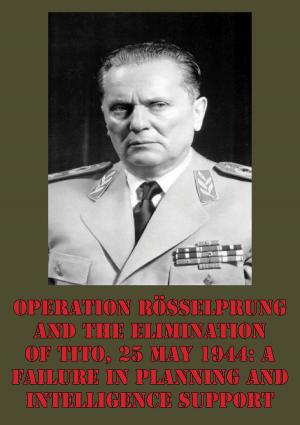Rommel’s Desert Campaigns, February 1941-September 1942: A Study In Operational Level Weakness [Illustrated Edition]
Nonfiction, History, Germany, European General, Military, United States| Author: | Major Donald E. Kirkland | ISBN: | 9781782894216 |
| Publisher: | Lucknow Books | Publication: | August 15, 2014 |
| Imprint: | Lucknow Books | Language: | English |
| Author: | Major Donald E. Kirkland |
| ISBN: | 9781782894216 |
| Publisher: | Lucknow Books |
| Publication: | August 15, 2014 |
| Imprint: | Lucknow Books |
| Language: | English |
Includes the War in North Africa Illustration Pack - 112 photos/illustrations and 21 maps.
This study is a historical analysis to determine why Rommel’s tactical success on the battlefield could not accomplish strategic objectives in North Africa. Rommel’s operations are reviewed from his arrival in North Africa in February 1941 through his last offensive to destroy the British Eighth Army at Alamein in August-September 1942. The study compares his ability to conduct tactical operations with his apparent inability to plan and execute actions at the operational level of war. Rommel’s problems with operational planning are addressed within the scope of campaign planning principles set forth in FM 100-5, Operations, (Final Draft). His planning is expressly judged on how he shaped his operational plans by using the concepts of aims, resources, constraints, and restrictions to conform to strategic guidance. Rommel’s tactical execution is contrasted with his operational performance. This comparison is based on the AirLand Battle tenets of agility, initiative, depth, and synchronization. The study concludes that Rommel’s failure lies in planning operations that exceeded his resources and conducting needless operations that resulted in the loss of the initiative at the decisive point. Rommel’s plans exceeded the strategic objectives desired by the theater strategists. His execution was ultimately defeated by his quest for tactical victories without regard to how they contributed to achieving campaign objectives. Rommel’s weakness at the operational level led to failure to sequence tactical victories to achieve campaign goals. This failure illustrates the importance of understanding how operational art orchestrates tactical activities to achieve strategic objectives within a theater of operations.
Includes the War in North Africa Illustration Pack - 112 photos/illustrations and 21 maps.
This study is a historical analysis to determine why Rommel’s tactical success on the battlefield could not accomplish strategic objectives in North Africa. Rommel’s operations are reviewed from his arrival in North Africa in February 1941 through his last offensive to destroy the British Eighth Army at Alamein in August-September 1942. The study compares his ability to conduct tactical operations with his apparent inability to plan and execute actions at the operational level of war. Rommel’s problems with operational planning are addressed within the scope of campaign planning principles set forth in FM 100-5, Operations, (Final Draft). His planning is expressly judged on how he shaped his operational plans by using the concepts of aims, resources, constraints, and restrictions to conform to strategic guidance. Rommel’s tactical execution is contrasted with his operational performance. This comparison is based on the AirLand Battle tenets of agility, initiative, depth, and synchronization. The study concludes that Rommel’s failure lies in planning operations that exceeded his resources and conducting needless operations that resulted in the loss of the initiative at the decisive point. Rommel’s plans exceeded the strategic objectives desired by the theater strategists. His execution was ultimately defeated by his quest for tactical victories without regard to how they contributed to achieving campaign objectives. Rommel’s weakness at the operational level led to failure to sequence tactical victories to achieve campaign goals. This failure illustrates the importance of understanding how operational art orchestrates tactical activities to achieve strategic objectives within a theater of operations.
![Cover of the book Rommel’s Desert Campaigns, February 1941-September 1942: A Study In Operational Level Weakness [Illustrated Edition] by Major Donald E. Kirkland, Lucknow Books](https://www.kuoky.com/images/2014/august/500x500/9781782894216-IQzb_500x.jpg)
![Cover of the book Gun Fodder - Four Years Of War [Illustrated Edition] by Major Donald E. Kirkland](https://www.kuoky.com/images/2015/november/300x300/9781786255310-qYJa_300x.jpg)








![Cover of the book OMAHA BEACHHEAD - (6 June-13 June 1944) [Illustrated Edition] by Major Donald E. Kirkland](https://www.kuoky.com/images/2014/august/300x300/9781782892632-IFKo_300x.jpg)


![Cover of the book Love Of An Unknown Soldier: Found In A Dug-Out [Illustrated Edition] by Major Donald E. Kirkland](https://www.kuoky.com/images/2015/november/300x300/9781786255181-gWT3_300x.jpg)

